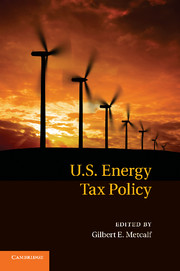Book contents
- Frontmatter
- Contents
- Conference Participants
- 1 Introduction
- 2 Distributional Impacts of Carbon Pricing Policies in the Electricity Sector
- 3 Distributional Impacts of a U.S. Greenhouse Gas Policy
- 4 Instrument Choice Is Instrument Design
- 5 Taxes, Permits, and Climate Change
- 6 Border Adjustments for Carbon Taxes and the Cost of Emissions Permits
- 7 Taxes and Caps as Climate Policy Instruments with Domestic and Imported Fuels
- 8 How Much Should Highway Fuels Be Taxed?
- 9 State Tax Policy and Oil Production
- 10 The Social Costs and Benefits of U.S. Biofuel Policies with Preexisting Distortions
- Index
- References
7 - Taxes and Caps as Climate Policy Instruments with Domestic and Imported Fuels
Published online by Cambridge University Press: 01 June 2011
- Frontmatter
- Contents
- Conference Participants
- 1 Introduction
- 2 Distributional Impacts of Carbon Pricing Policies in the Electricity Sector
- 3 Distributional Impacts of a U.S. Greenhouse Gas Policy
- 4 Instrument Choice Is Instrument Design
- 5 Taxes, Permits, and Climate Change
- 6 Border Adjustments for Carbon Taxes and the Cost of Emissions Permits
- 7 Taxes and Caps as Climate Policy Instruments with Domestic and Imported Fuels
- 8 How Much Should Highway Fuels Be Taxed?
- 9 State Tax Policy and Oil Production
- 10 The Social Costs and Benefits of U.S. Biofuel Policies with Preexisting Distortions
- Index
- References
Summary
Introduction
Most economists and policy makers today seem to find few fundamental differences between setting an emissions tax and setting a cap on total emissions with free trade of emissions rights among emitters, as an effective policy tool for reducing global carbon emissions. This chapter demonstrates that such a view is generally incorrect. The two climate policy instruments are not (and are often far from) equivalent when different groups of countries have antagonistic interests in fuel markets. I will make the assumption, considered realistic, that these markets and policies are dominated by two groups of countries, with clashing interests: one group that consumes most fossil fuels, and that defines and implements climate policy; and another group that produces fossil fuels. Importantly, both producer and consumer countries tend, as groups, when their within-group policies are coordinated, to behave noncompetitively in the fossil fuels markets. I then show that tax solutions typically dominate cap-and-trade solutions, as the most efficient and effective climate policy instruments from the point of view of fuel-consuming countries.
I consider a highly stylized set-up in which the world economy is divided into two blocs. The first bloc, called region A, consumes all fossil fuels and defines and implements a climate policy. I assume that region A consumes two fuels: fuel 1, imported entirely from the other region (think of oil), and fuel 2, produced in its entirety within region A itself (interpreted alternatively as coal, natural gas, or renewables).
- Type
- Chapter
- Information
- US Energy Tax Policy , pp. 233 - 268Publisher: Cambridge University PressPrint publication year: 2010
References
- 2
- Cited by



